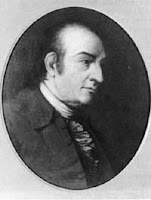 |
| The Liberty Tree |
 |
| New Hampshire's state flag |
The flag of New Hampshire is a clean and classic design employing a field of blue with the state seal in the middle surrounded by the legend, "Seal of the State of New Hampshire 1776."
The legend is further encircled by a ring of laurel leaves and nine
stars to represent New Hampshire's standing as the 9th of the original
13 colonies.
The design was adopted in 1909 and has had but a single change since which was to clarify the design of the seal.
The flag of Virginia,
like New Hampshire's flag, consists of a blue field with the official
seal in the center. Specifically, it includes Virginia's coat of arms
from the Continental Convention of 1776. George Mason and Thomas Jefferson's law professor, George Wythe, designed the seal.
 |
| Flag of the Commonwealth of Virginia |
This coat of arms is
both arresting and highly symbolic as it features Virtue, portrayed as
"an Amazon" in classical Greek garb of helmet and toga. Virtue holds a
spear in one hand, its point resting on the ground; and a sword in the
other, pointing up. Virtue, symbolizing Virginia, has its foot resting
on the seemingly dead figure of a man representing tyranny. A crown is
on the ground beside the fallen tyrant. The legend reads: Sic Semper Tyrannis ("Thus always to tyrants" i.e., "death to tyrants").
Where have I heard that phrase before?
"Sic
semper tyrannis" is generally attributed to Brutus after Caesar's stabbing. John Wilkes Booth uttered the phrase after shooting
President Lincoln.
The First Flag of the Commonwealth of Virginia
Formally, Virginia is a commonwealth
rather than a state, a designation also used by Kentucky, Massachusetts
and Pennsylvania. The flag of the Commonwealth of Virginia, however,
was not adopted until after Virginia seceded from the Union. In preparing for the upcoming civil war, the Virginia Convention of 1861 (the Secession Convention) first voted to repeal its ratification of the US Constitution
(April 17, 1861) making it an independent state and free to adopt
another constitution, that of the Confederacy. Less than a fortnight
later, it voted in its official flag (April 30, 1861).
 | |
| George Wyte |
Changes to Virginia's flag,
like New Hampshire's flag, have been minimal. They include a white
fringe added to the fly in 1930, and an ornamental border of Virginia
Creeper that was added around the seal in 1931. Colors were codified in
1949.
The Great Minds Link
George Wyte not only taught law to Jefferson but also Henry Clay and James Monroe. To find out more about this man, the first law professor in America, go to this link:
 |
| George Mason |
Who was George Mason?
If George Wyte was our first law professor, George Mason was the mastermind behind both the Declaration of Independence and the US Constitution. Mason is the framer of the forerunner to those documents, the Virginia Declaration of Rights. To read this document, go to this link:
No comments:
Post a Comment